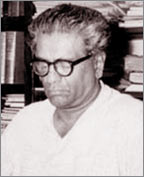The three-headed donkeys and Colombo's new Municipal Council
by Rajan Philips
The law screwed them first. Then the Colombo voters shot themselves
in the foot. Because a single candidate did not meet the age requirement
an entire list of candidates of the UNP was rejected as ineligible. The
letter of the law prevailed over the spirit of democracy, learned
absurdity over simple commonsense.
The irregular UNP list, going by the different accounts in the media,
appears to have been the result of party infighting. Regardless, the
faction wanting to take control of Colombo fielded a list of independent
candidates as proxies only to resign after the election.

The voters elected the largest number from the proxy list and under
the municipal elections law this proxy group is automatically conferred
with executive power even though the group does not have a clear
majority in Council.
Now it transpires that the law does not permit the elected
independents and their UNP alternates to switch places as swiftly as
they thought they could.
"The three-headed donkeys", Dr. Colvin R. de Silva colourfully
described the independent members, quite a few of them, elected to our
first parliament after independence.
And Colombo is now stuck with twenty - three similar specimens,
without a leader and not knowing which way to turn or run, let alone
govern.
The voters could have done themselves a favour and avoided shooting
themselves in the foot by electing the team of Vasudeva Nanayakkara who
ran a principled campaign on a comprehensive and even ambitious
platform. In their inscrutable wisdom, the voters gave him only 14
Councillors.

Steeped in a political tradition that readily accepts the verdict of
the voters regardless of the merit of the verdict, Mr. Nanayakkara has
indicated that he would play the part of the Leader of the Opposition in
the new Council. What he might have wanted to do as Mayor he will now
have to push for from the opposition, and he has the majority to do it.
It is not clear whether the new Council will get to function - either
with the elected independents or their backroom alternates. It may
continue to be paralyzed by the legal shenanigans and political
chicanery that have so far marred this election. Or there could be a new
election - all over again for what is Sri Lanka without surplus
elections.
Beautiful Colombo
Whatever happens, Vasudeva Nanayakkara, now that he has thrown his
electoral hat in the local political arena, should stay put and
contribute to making Colombo a better place for its residents and a
better example to the rest of the country.
Thanks to decades of corruption, cronyism and institutional malaise
what was once a beautiful and functioning city into an ugly and
dysfunctional conglomerate. Colombo deserves to become a beautiful and
functional again.
Its first priority is to address the growing gaps within its bosom:
the gaps between rich and poor with a struggling middle class in
between, landlord and tenant, saunas and slums, luxury cars and tired
pedestrians, international English schools for the chosen and national
Swabasha schools for the rest, five star hospitals and half star
clinics, super markets and pavement hawkers, expatriate condos and
Madras lodges for the locals. The list goes on.
Anyone active in local politics should take it as both a moral
calling and a political imperative to attend to the urban poor and the
have-less working and middle classes who go through all the misery of
urban living but share little of its pleasures.
But to be able to help them structurally out of their misery and help
them in the long run, the City Council should pay attention to
minimizing the external pressures on Colombo and to addressing its
internal problems. Let me elaborate.
Colombo is a paradoxical city. In comparison to cities in other
countries, it is not a big city, but for all of Sri Lanka Colombo is the
only city. It is a city of less than a million people but it is also the
city for over 20 million Sri Lankans.
Every Sri Lankan, or Sri Lankan household, has a stake in Colombo and
their combined expectations and pressures almost on a daily basis can
wear down even the most efficient and resourceful metropolis. And
Colombo is neither.
The City is buffeted by endless in-migration and ever-increasing
daily traffic from outside its limits. This causes pressures and
unrealizable demands on the facilities that Colombo as a municipality is
expected to give its rate payers: housing, schools, hospitals, garbage
disposal, roads, water, sewerage etc.
Where it cannot meet these demands the City ends up with huge
infrastructure deficits - that people experience daily: traffic
congestion, uncollected garbage, lack of schools, shortage of housing
and health facilities, as well as frequent water and electric power cuts
(although these shortages arise from factors outside the City's
control).
Where the City tries to meet its demands either through the real
estate development market or through individual initiatives - the
outcome is one of spatial anarchy.
The once pleasing streetscapes of Colombo are turning into vistas of
visual pollution.
The big gap
Condominiums are sprouting like mushrooms without proper assessments,
according to newspaper reports, to verify if they are within existing
infrastructure capacity. The spatial anarchy compounds the
infrastructure deficit - not just in regard to physical infrastructure
but also the social infrastructure of health, education and recreation.
The second priority, then, is to initiate the process of relieving
Colombo of its pressures from the 19 million Sri Lankans outside of
Colombo. These pressures are the direct result of the socioeconomic
disparities between Colombo (and the Western Province) and every other
Province and local body.
A necessary, but not sufficient, response to this is the devolution
of powers and functions away from the (Colombo) heartland to the
hinterland.
In other words: political devolution and administrative
decentralization. There is no way around them, and fundamental to both
is local government reform and the empowerment of Colombo and other
local bodies. The handbook for LG reform is already there: the 1999 H.
A. P. Abhayewardhana Commission Report on Local Government Reform.
Vasudeva Nanayakara was among the few parliamentarians who gave oral
evidence before the Abhayewardhana Commission in 1998. Now he has the
opportunity and the obligation to actively facilitate the implementation
of the Commission's recommendations.
LG reform could be undertaken incrementally and functionally in
specific areas and provide the foundation for a more broadly scoped
devolution.
As I have pointed out in an earlier article, the powers and functions
that initially resided in the local bodies were gradually taken over by
central government boards and agencies. Examples of these include the
Electricity Board, Water Supply and Drainage Board, the Urban
Development Authority etc. It is a longstanding practice everywhere to
assign these functions and powers to local bodies, and where appropriate
to provincial or regional bodies
The Colombo municipality should seriously review its existing
practices and reclaim responsibilities for functions that should
properly fall within its purview. As a rule, as far as possible, the
reallocation of responsibilities should go along with the transfer of
resources including staff, from the central agencies to the
municipality.
The functional reallocation of responsibilities between the central
agencies and the Colombo municipality has a direct bearing on what
should be the third priority for the new Council, namely, dealing with
the problems of - what I have called - infrastructure deficit and
spatial anarchy.
The main challenge in building capacity in essential services such as
water, sewerage, transport, electricity and garbage, is to identify in
which of these areas the Colombo municipality could act alone within its
jurisdiction and in which areas it is necessary to act in concert with
adjacent local bodies and even the Western Provincial Council.
For example, in the area of transport, Colombo is part of a much
wider 'commutershed' (analogous to watershed) that virtually covers the
whole of the Western Province.
A transport 'solution' should therefore be sought at the broader,
Greater Colombo Area, level but the City will have to be a principal
player in the process. A 'transport solution' for the Greater Colombo
Area is a subject by itself and deserves a separate discussion, some
other time.
Within its own jurisdiction, the City should look after the City bus
service, school bus service, City roads, traffic control measures,
parking etc. Economies of scale will also require cooperation among
municipalities in regard to garbage collection and disposal.
Time to plan
To deal with the spatial anarchy that is destroying Colombo, the
municipality should reclaim the powers and functions of physical
planning and approving developments. These now reside mostly with the
UDA, which, modeled as it is on the practice of a city-state like
Singapore, is an anachronism for Sri Lanka.
The UDA has a role to play - in setting national standards and
providing technical assistance to smaller municipalities but should stay
out of areas that really belong to Colombo and other local bodies.
The fourth priority, encompassing the first three, would be to lay
the foundation for a strong, streamlined and professional administration
that will deal with all the matters that the municipality is mandated to
address. I say "lay the foundation" for good reason, as it would be
impossible to build a new administration and deliver substantially on
each of the three priorities during a single Council term.
The key is to make a good start, identify and focus on what is
doable, create the nucleus for a good institution and ensure its
continuity. |













